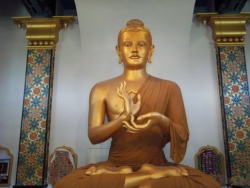Difference between revisions of "Geshe Ngarampa"
Jump to navigation
Jump to search
(Created page with " Geshe Ngarampa degree, {{Wiki|equivalent}} to a Doctor of Tantrayana Psychology. The Geshe Lharampa degree requires intensive training in logic a...") |
|||
| Line 1: | Line 1: | ||
| − | + | [[File:626-1000.jpg|thumb|250px|]] | |
| − | [[Geshe Ngarampa]] [[degree]], {{Wiki|equivalent}} to a Doctor of [[Tantrayana]] [[Psychology]]. | + | [[Geshe Ngarampa]] [[degree]], {{Wiki|equivalent}} to a [[Wikipedia:Doctor (title)|Doctor]] of [[Tantrayana]] [[Psychology]]. |
The [[Geshe Lharampa]] [[degree]] requires intensive training in [[logic]] and practicing in [[debates]] where a [[master]] [[teacher]] (interlocutor) spars with a student in a series of questions and answers. A candidate’s competency is demonstrated in a public [[debate]] in front of thousands of [[monks]] ([[scholars]] and novices alike). The rigor in [[logical]] [[thinking]] has its [[roots]] in classical [[Indian]] [[philosophical]] schools. | The [[Geshe Lharampa]] [[degree]] requires intensive training in [[logic]] and practicing in [[debates]] where a [[master]] [[teacher]] (interlocutor) spars with a student in a series of questions and answers. A candidate’s competency is demonstrated in a public [[debate]] in front of thousands of [[monks]] ([[scholars]] and novices alike). The rigor in [[logical]] [[thinking]] has its [[roots]] in classical [[Indian]] [[philosophical]] schools. | ||
{{E}} | {{E}} | ||
| − | [[Category:]] | + | [[Category:Tibetan Buddhist titles]] |
Revision as of 08:07, 24 February 2014
Geshe Ngarampa degree, equivalent to a Doctor of Tantrayana Psychology. The Geshe Lharampa degree requires intensive training in logic and practicing in debates where a master teacher (interlocutor) spars with a student in a series of questions and answers. A candidate’s competency is demonstrated in a public debate in front of thousands of monks (scholars and novices alike). The rigor in logical thinking has its roots in classical Indian philosophical schools.
